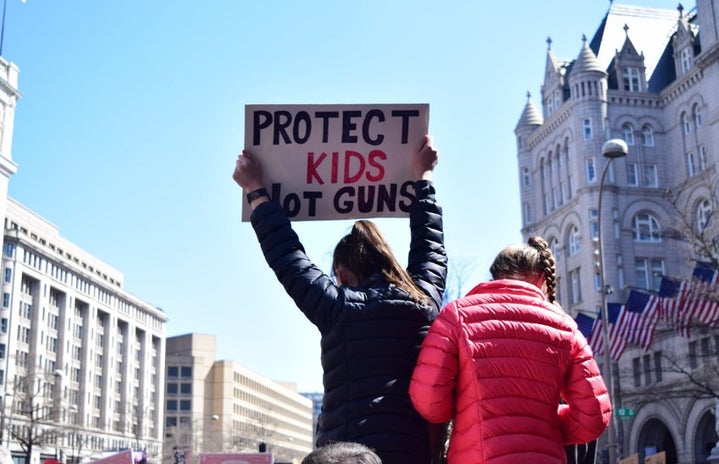The conversation around “stand your ground” laws and gun violence is a constant one in politics, news, and social media. With acts of gun violence happening on the daily, it is always a current topic. This past month has seen a terrifying trend in gun violence across the country. They have all involved the shooting of teens for making mistakes. The first one I saw on my feed was Ralph Yarl, who was shot for ringing a doorbell. After that, I began seeing posts mentioning Payton Washington and Kaylin Gillis. As I looked into all of these cases, it was easy to see the similarities between them. With these similarities comes the realization or reaffirmation for many that we live in a “shoot first” society.
The first senseless act of violence that sparked this conversation about gun violence and “stand your ground” laws was the shooting of Ralph Yarl in Missouri. Ralph, a 16-year-old boy, was going to pick up his younger brothers. He accidentally mixed up the address and went to 1100 NE 115th Street instead of 1100 NE 115th Terrace — an easy mistake, considering the only difference between the addresses is the name of the road. Yarl rang the doorbell and soon after was shot in the head and the arm by homeowner Andrew Lester. He was rushed to the hospital and was in critical condition from his injuries. He did survive and was able to make it out of the hospital, but there is still a long way to go until he can go back to school and activities like playing the saxophone.
Andrew Lester has been charged with two felonies, assault in the first degree and armed criminal action. He has pleaded not guilty to both and his bond was set at $200,000. This shooting at first to me was very shocking, but having taken time to reflect, it’s not shocking at all. It seems likely every day that we hear about a mass shooting or an incident of gun violence.
In addition to our country’s gun violence issue, there is a problem with the way Black children and men are viewed and treated. Lester told the police that when he saw Yarl he shot because he was “scared to death” as a result of Yarl’s size. Ralph Yarl is under six feet tall and weighs 170 pounds, not above average for a 16-year-old boy. It’s clear to see that the adultification bias of Black teens and kids is at play here. The adultification bias is when Black children are not given the same leniency and expectations as other kids. This is a result of Black children being viewed as more mature and less “innocent” than white children. Research has shown that Black young men and teens are perceived as more intimidating than white young men of the same size.
Kaylin Gillis was another teen shot at and tragically killed in the last month for making a directions mistake. She was in a car with her friends when they pulled into what they thought was their friend’s driveway. They quickly realized that they were in the wrong driveway and started to turn around, when the homeowner, Kevin Monahan, fired two shots at the car. Gillis was struck, and despite the efforts made by emergency responders, she was soon pronounced dead.
Like Yarl, Gillis was a young girl, only 20 years old, who had made a mistake in which house she went to. Her and her friends posed no clear threat, as they were leaving the home when Monahan came outside. Monahan was arrested, but it took the officers an hour, as when they came to his house he wouldn’t leave or communicate at all. He has been charged with first-degree assault and has pleaded not guilty. Just like Yarl’s, this incident made me consider all the times I’d pulled into the wrong driveway or wrong house. Kaylin had made an honest mistake and she and her friends immediately recognized it and left. Even more disturbing is the lack of responsibility by Monahan. His lawyer claimed, “he didn’t mean to hurt anyone,” a shocking statement when his client shot two bullets toward the car.
Another recent incident of gun violence was the shooting of Payton Washington. Washington’s friend, Heather Roth, stepped out of a friend’s car and into what she thought was her own. After seeing a man in the passenger seat, she went back into her friend’s car, thinking he had broken into her car. When she saw the owner of the car she had gone into, Pedro Tello Rodriguez, she rolled down her friend’s window to apologize, but Rodriguez then started shooting into the car. Roth was grazed with the bullet, but Washington was hit in the leg and the back. Rodriguez has been charged with deadly conduct as more legal proceedings await. Payton Washington is an All-Star cheerleader on an Elite World’s team, and had a scholarship to Baylor for tumbling. This was a particularly scary incident to think about, as I’ve also stepped in the wrong car after cheerleading practice. This also hit home for me, as I grew up doing all-star cheerleading and watching the Woodland Elite All-Stars World’s team, which Payton was on.
After these three shootings, discourse about “stand your ground” and “castle doctrine” laws have started, along with debates as to whether they will play a role in any of these cases. “Stand your ground” laws allow citizens to use deadly force if they find it reasonable in a situation where they feel threatened. Such laws vary slightly from state to state in wording and enforcement but generally hold this core message. “Castle doctrine” laws state that there is no duty to retreat when in your own home.
In the case of Ralph Yarl, it is not totally clear whether Missouri’s “stand your ground” law will be used in court. Some attorneys have argued that proving that Yarl was threatening Lester would be too hard to prove when making a “stand your ground argument.” Others think it depends on the detail of whether Yarl shook the door handle after ringing the doorbell. Lester claims he did this, while Yarl says he only rang the doorbell. For Kaylin Gillis, New York does not have “stand your ground” laws, so Monahan would not be able to use this defense. The “castle doctrine” could also not be used here because the car was in the driveway, so they were on the property, not in the house. The shooting of Payton Washington is in Texas, which has “stand your ground laws,” but it is not clear yet what Rodriguez is pleading and his attorney’s strategy.
Many Americans agree that there is a right to defend ourselves, but to what extent? How far should our self-defense laws go? Should there be a duty to retreat? Should it apply in one’s home? What constitutes a threat? All of these questions have been floating in the minds of American citizens and lawmakers for years, but it seems there’s no clear answer.
Only one thing is clear: America has a gun violence problem, and part of it can be attributed to the culture surrounding guns. America’s culture around guns and self defense is “shoot first ask questions later,” which can be exacerbated by having loose self defense laws. According to a 2022 study from Jama Network, “stand your ground” laws across 41 states are associated with an 11% increase in monthly firearm homicide rates: about 700 additional homicides a year. It is clear that self-defense laws in many states need to be reevaluated and reconsidered to serve for the safety of all Americans. It is important to have your voice heard on these topics and to remember those killed or impacted by gun violence.
Ralph Yarl and Payton Washington both have bright futures, one in music and the other in athletics, and luckily they survived, but their lives will never be the same. Kaylin Willis will unfortunately never be able to live out her dreams of attending college in Florida for Marine Biology or see her family again. When we see a headline every day, it can become desensitizing, but it’s important to remember those aren’t numbers or names, they’re people. People with families, hopes, and dreams.


